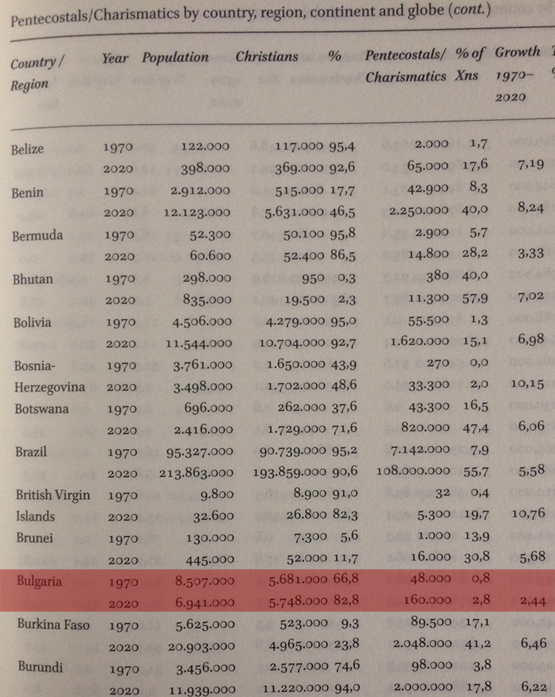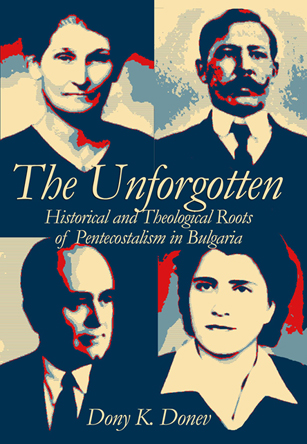21st Annual Conference of Bulgarian Church Held in Las Vegas
Full Gospel Pentecost Sunday
I keep on repeating this through the years, but the need for the constant repetition comes from the simple fact that among new doctrinal teachings and Hillsong style of worship the True Message of Pentecost remains long forgotten
- Salvation – That a man must be saved while the hour of grace is still upon us has been that teaching of every protestant evangelical since the Reformation. Why people attend church all their lives without getting saved is beyond me. But I do know that the commitment of the CHURCH to REVIVAL brings people to SALVATION.
- Sanctification – The Wesleyan teaching of sanctification resolves that the sanctification of the believer is definite. This means that though it may progress and evolve through time, as the believer gets closer to God in his/her daily walk, sanctification must become ENTIRE i.e. allowing NO sin to abide in the believer’s body, soul or spirit. Without ENTIRE sanctification resulting in holiness, no one will ever see God (Heb. 12:14).
- Holy Ghost Baptism – The doctrine of the Baptism with the Holy Ghost means that when baptized we speak in one tongue with God because we are ONE with His Spirit. Not just in us or upon us, but that we are IN the Spirit as John was on the day of Revelation.
- Healing in the Atonement of Christ belongs to every believer. This means you, your family and your church members. The healing provided in the Atonement is for ALL believers – no exception. It is also for ALL sickness, disease, viruses, infections, tumors and cancers. But that it belongs to does not yet mean that it has been received by the believer. For this reason, God does not stop healing neither in this age nor through eternity, as the leaves of the Tree of Life in the New Jerusalem are still and forever for the healing (Rev. 22:2)
- The Second Coming of Christ for Pentecostals is not simply pre-millennial, but also pre-Tribulation. There have been MANY teachings on the End Times until today. Post-millennials claim we live in the Millennium even now anticipating the return of the Lord; a-millennials that there will be no Millennium at all. Post-tribulationists expect his return at the end of the Tribulation, mid-post-tribulationists in the middle. But in Pentecost, we expect Christ to return before the Tribulation that we may be saved from the hour of trial (Rev. 3:10) and before the Millennium so we may reign with Him 1,000 years. Any other message is no message of hope for the Church of the Living God.
Speaking in Tongues in America Prior to the Azusa Street Revival of 1906
April, 1906 – The Azusa street revival swept the globe starting with California
January 1, 1901– The initial phenomenon of speaking in tongues occurred at Parham’s school in Topeka, Kansas
January 6, 1900 – Frank Sanford’s Shiloh school reported that “The gift of tongues has descended”
1896 – Over 100 people baptized in the Shaerer schoolhouse revival conducted by the Christian Union in the North Carolina mountains
1887 – People falling in trances and speaking in tongues were reported at Maria Etter’s revival meetings in Indiana
1874 – Speaking in tongues occurred during healing meetings reported in New York
1873 – William H. Doughty and the Gift People of Rhode Island spoke in tongues
1854 – V. P. Simmons and Robert Boyd reported tongue speaking during Moody’s meetings

FURTHER READING:
Church of God (Cleveland, TN)
- Alive, alive! (A personal testimony)
- Church of God Primitivism
- Bulgarian Church of God
- J.W. Buckalew
- Why revival came? by Dr. Charles Conn
Azusa Street Revival of 1906
- Lucy F. Farrow: The Forgotten Apostle of Azusa
- The FORGOTTEN ROOTS OF THE AZUSA STREET REVIVAL
- Azusa Street’s Apostolic Faith Renewed
- Azusa Street Sermons
- Pentecostal Primitivism Preserved
Prior to Azusa Street Revival of 1906
- First person to speak in tongues in the Assemblies of God was William Jethro Walthall of the Holiness Baptist Churches of Southwestern Arkansas
- The Work of the Spirit in Rhode Island (1874-75)
- Speaking in Tongues in America Prior to the Azusa Street Revival
- WAR ON THE SAINTS: Revival Dawn and the Baptism of the Spirit
- How Jezebel Killed One of the Greatest Revivals Ever
The Unforgotten: Historical and Theological Roots of Pentecostalism in Bulgaria
SEE MORE at Amazon.com by clicking this link
The Istanbul Convention introduces a 3rd Social Gender
“Yesterday, the European Parliament supported the Istanbul Convention. From the Bulgarian Socialist Party, in the 4th consecutive National Assembly, we are introducing a Law on Combating Domestic Violence, but behind the scene of this noble cause, the Istanbul Convention introduces a third social gender, different from the biological male or female, into European legislation.” said BSP leader Kornelia Ninova from the parliamentary rostrum.
According to her, the EP ratified the convention, which means that it becomes a Union obligation and European law, which stands above national law.
“The Court of the EU in 2021 confirmed that the EU can ratify the convention without the member states having confirmed it unanimously. 6 countries are against it. The EU Council asked the EP to accept the decision and yesterday it was accepted by an overwhelming majority. Yesterday, Bulgarian MEPs from all parliamentary groups voted ‘for’. Yesterday Sergey Stanishev and Elena Yoncheva voted ‘for’, and the other colleagues from BSP were silent. For these people, ours and yours, there is no Constitution of Bulgaria and decisions of the Constitutional Court. It does not matter to them the opinion of 80% of Bulgarian citizens and religions. There is no national sovereignty,” added Kornelia Ninova.
She called for support for the referendum on banning gender ideology in schools. “Your signature today is an investment in the life and future of the children and of Bulgaria“, emphasized Ninova.
“Tomorrow, Stanishev is organizing a conference on the modern left. This is not a modern left. This is their left-gender ideology. For us, the modern left is something else – workers’ rights, ecology, a healthy lifestyle. For us, these are progressive topics. For them gender is progressive left. And that is why this is an attack on BSP. And this fight is part of BSP‘s downfall during elections. You don’t know how strong is this external pressure. BSP is the only party which is against this, from start to finish, for 6 years, but this is not a party issue, but a national cause, the future of our children,” said Kornelia Ninova.
Day 500 of the invasion on Ukraine
Day 500 of the invasion on Ukraine. Summary of key events in the last 24 hours:
- ISW: Exhausted squads and ineptitude fail the Russians at Bakhmut
- Ukrainian forces announced that they destroyed a Russian military unit near Bakhmut
- Zelensky vowed to regain the entire territory of Ukraine
- “We need more time”: Zelensky postpones the counteroffensive
- The Kremlin has acknowledged difficulties in the war in Ukraine
- NATO does not view China as a military threat, but does Russia and terrorists
- The New York Times: Putin has no plan B for the war in Ukraine and has set himself up for a trap
- Assets of the oligarch Malofeev are directed to rebuild Ukraine
ISW: Exhausted squads and ineptitude fail the Russians at Bakhmut
“Russia is sending depleted troop groups to the Bakhmut front, which, combined with apparent gaps in command and control, are likely to prevent Russian forces in the area from conducting credible defensive operations.” This is the assessment of a new analysis by the Institute for the Study of War (ISW).
The Russian 72nd Separate Motorized Rifle Brigade, which was destroyed near Bakhmut in September last year, had previously suffered losses in the Kharkiv region during the counteroffensive of the Ukrainian armed forces, and in October 2022 its surviving elements were defeated in the Mykolaiv region, the military said experts.
On August 7 last year, the ISW announced that the formation of the 72nd Independent Motorized Rifle Brigade in Russia‘s Orenburg Region had begun.
The Russians have been trying to capture Bakhmut for months now, but they are getting a decent rebuff from the defenders of Ukraine and suffering huge losses.
On May 9, Ukrainian soldiers routed the enemy’s 72nd Brigade.
The commander of the Ground Forces of the Armed Forces of Ukraine, Colonel-General Oleksandr Sirsky, said that in some parts of the front near Bakhmut, the Russians retreated under the pressure of the Ukrainian army by up to two kilometers.
The commander of “Azov” Andriy Biletsky stated that as a result of the offensive, the Ukrainian soldiers almost completely destroyed several regiments of the 72nd ODVMV.
Ukrainian forces announced that they destroyed a Russian military unit near Bakhmut
Ukrainian forces said they destroyed a Russian military unit near the eastern city of Bakhmut. The latest developments confirm Kremlin spokesman Dmitry Peskov’s statement that Moscow is facing a “very difficult” military operation.
In an interview with Bosnian television, the Kremlin spokesman said that the Russian military operation in Ukraine is very difficult, but will continue. He added that Russian forces have managed to inflict serious damage on the Ukrainian army, that they will not stop and that with the help of high-precision missiles, the Russian side has managed to destroy military production and stockpiles of Ukrainian weapons.
Yesterday, however, the commander of the Ukrainian ground forces, Oleksandr Syrsky, said that the Ukrainians were carrying out successful counterattacks in the Bakhmut region and had managed to push the Russians out of some sections of the front, which was confirmed earlier by the head of the Russian private military company “Wagner” Yevgeny Prigozhin . According to him, in the battle in question, the Russians ceded territory with an area of three square kilometers, for which 500 victims were given.
Meanwhile, Ukrainian President Volodymyr Zelensky said that a fundamentally new concept of Ukrainian security is being developed and that Kyiv is actively working with its international partners on new defense packages for the country.
In his evening video address, Zelensky vowed to regain every bit of the territory occupied by Russia.
“Let us not forget for a minute that every day of the presence of the occupier on our land is a temptation for him to think that he will succeed. He will not succeed! We must bring freedom, security and Europe back to all Ukrainian land – to all European land. We will do it! We will not leave one bit of our land to the enemy – tyranny will not rule anywhere.”
Zelensky vowed to regain the entire territory of Ukraine
Ukraine‘s President Volodymyr Zelensky vowed last night to regain every bit of territory occupied by Russia, at a time when his fighters on the front are said to have made territorial progress near the contested city of Bakhmut, DPA reported, BTA broadcasts.
“We will not leave a single piece of our land to the enemy – tyranny will not rule anywhere,” Zelensky said in his evening video address. “We must bring freedom, security and Europe back to all Ukrainian land,” he added.
His address came hours after Ukrainian forces, who are waging heavy fighting for control of eastern Donetsk region, said they had pushed Russian forces to within 2 km in some places near Bakhmut.
“We are conducting effective counterattacks there,” Ukrainian ground forces commander Oleksandr Syrsky said on Telegram on Wednesday night.
Sirsky said units of the Russian Wagner mercenary force stationed at Bakhmut had been replaced in some sectors by regular Russian units. These less well-prepared combat units have now been routed, the commander said, adding that “the battle for Bakhmut continues“.
Andriy Biletsky, founder of the Ukrainian Azov Battalion, reported on Telegram that the territory was completely cleared of Russian soldiers and at least two Russian brigades were destroyed and prisoners of war were taken.
As the fighting continued, Wagner’s commander, Yevgeny Prigozhin, said he feared his unit could be surrounded in the Battle of Bakhmut. “In view of the lack of ammunition, the ‘meat grinder’ is now threatening to turn in the opposite direction,” Prigozhin wrote on Telegram yesterday.
Due to the large losses in manpower, “Wagner” was forced to leave the protection of the flank to regular units of the Russian army, which were pushed back to a depth of up to 2 km.
“There is now a serious danger of Wagner being encircled because of the collapse of the flanks. And the flanks are already showing cracks and disintegration,” wrote Prigozhin.
Meanwhile, Russia has called up its reservists for annual exercises. A document to this effect, signed by Russian President Vladimir Putin, was published yesterday in the State Gazette.
According to the decree, the Ministry of Defense can issue the relevant instructions to the military districts, which will then call up the reservists for the exercise, TASS reported. In view of the war in Ukraine, however, many reservists may question whether they have been called up for training or could be sent to the front.
According to foreign estimates, Russia has about 2 million reservists, of which up to 150,000 are said to have been sent to Ukraine. In the recent mobilization, many young men chose to flee abroad.
For weeks, there have been expectations of a large-scale counteroffensive by the Ukrainian army. However, Ukrainian Foreign Minister Dmytro Kuleba warned against expecting too much from a possible spring offensive by Ukrainian forces. “Don’t see this counteroffensive as the last one, because we don’t know what will come of it,” Kuleba told Germany’s Bild newspaper, adding: “To win the war, you need weapons, weapons and more weapons.”
Meanwhile, the Czech Republic provided Ukraine with two Soviet 2K12 “Kub” anti-aircraft systems. The delivery also included a “relatively large number of missiles,” Czech President Petr Pavel said in a radio interview yesterday.
“We need more time”: Zelensky postpones the counteroffensive
Ukraine‘s President Volodymyr Zelensky said his country needs more time to launch a long-awaited counter-offensive against Russia as the military still needs promised help from the West, the BBC reported on Thursday.
The expected attack could be decisive in the war, redrawing front lines that have remained unchanged for months.
“With (what we have) we can go forward and be successful. But we will lose a lot of people. I think this is unacceptable,” he said in an interview with public broadcasters which are Eurovision members, including the BBC.
“So we have to wait. We need some more time though.”
The president described the combat brigades, some of which are trained by NATO countries, as “ready“, but said the army still needed “some things“, including armored vehicles which were “coming in batches“.
When and where the Ukrainian counteroffensive will begin is a secret. Russian forces have strengthened their defenses along a 1,450 km long front line that runs from the eastern regions of Luhansk and Donetsk to Zaporizhzhia and Kherson in the south.
In recent weeks, Ukrainian authorities have tried to play down expectations of a breakthrough, both publicly and in private talks, the BBC reports.
A senior government official, speaking on condition of anonymity, said the country’s leaders “understand that (they) have to succeed” but that the attack should not be seen as a panacea in a war that is now in its 15th month.
However, the president expressed confidence that the Ukrainian army could mount an offensive, warning of the risks of a “frozen conflict” that he said Russia was “relying on“.
The negotiations
For Kyiv, any outcome seen as disappointing to the West could mean a reduction in military support and pressure for negotiations with Russia, writes the BBC.
Since almost a fifth of Ukraine‘s territory is under Russian control and President Vladimir Putin has announced the annexation of four regions that his forces partially occupy (Donetsk, Luhansk, Zaporizhia and Kherson), this will likely mean that the talks will also include the issue of settlement of the territorial dispute over them.
“Everyone has ideas, but they cannot pressure Ukraine to hand over territories. Why should any country in the world give Putin its territory?“, the president asked rhetorically.
The allies
However, Zelensky dismissed fears of losing US support if President Joe Biden, who has pledged to support Ukraine as long as necessary, is not re-elected in 2024.
Ukraine, he said, still enjoys bipartisan support in the US Congress. “Who knows where we will be (when the election comes). I believe we will win by then.”
For now, peace talks are not seen as a realistic prospect, as both sides say they will fight for victory.
President Zelensky proposed a 10-point peace proposal calling for the return of all invaded territories, the payment of reparations for war-related damages and the creation of a special tribunal to prosecute Russian war crimes, a plan that Moscow has strongly rejected.
The sanctions
Western sanctions, the president said, were affecting Russia‘s defense industry, citing depleted missile stocks and artillery shortages.
“They still have a lot in their stockpiles, but … we are already seeing that they have reduced the shelling per day in some areas,” he told media.
However, Moscow has found ways to circumvent some of the measures, he said, and urged countries to target those helping Russia circumvent the bans.
The EU is already discussing new sanctions, which include trade bans on third countries that resell to Russia goods bought by them from the EU and which are on the Union’s sanctions lists.
Drones over the Kremlin
Zelensky again rejected Russia‘s accusation that Ukraine was behind last week’s alleged drone attack on the Kremlin, which Moscow described as an attempt to assassinate President Putin.
According to him, it was organized by Russia itself to use it as an “excuse” for attacks against Ukraine.
“They are constantly looking for something that sounds like a justification, saying: ‘You do this to us, so we do that to you,’” said President Zelensky.
However, according to him, the tactic failed even among Kremlin propagandists, “because it looked very, very artificial.”
Eurovision
The president spoke against the backdrop of the Eurovision Song Contest being held in the English city of Liverpool, which was chosen to host on behalf of Ukraine, the winner of last year’s contest.
He said he would prefer to see the competition in a neighboring country “where our people can travel and be very close” but that he has “a lot of respect” for Britain, an “amazing country“.
“The main thing is that the competition is taking place,” he said. “Let people show their talent.”
The Kremlin has acknowledged difficulties in the war in Ukraine
Russia‘s military operation against Ukraine is “very difficult” but will continue, Kremlin spokesman Dmitry Peskov told Bosnia’s ATV TV on Wednesday, as quoted by state news agency TASS.
Russia has managed to inflict serious damage on the Ukrainian military machine and that work will continue, he added in a lengthy interview during which he repeated many of Moscow’s talking points about the conflict, Reuters reported.
Russian troops invaded Ukraine in February 2022 in what Moscow called a “special military operation” and initially seized significant territory, some of which Ukraine retook in the fall. Kyiv is now planning a new counteroffensive.
According to Western calculations, Russia has lost more than 200,000 soldiers – killed or wounded.
“The special military operation continues. This is a very difficult operation and, of course, certain goals were achieved in one year,” said Peskov, quoted by TASS.
According to him, Russia has so far managed to partially achieve the goals of its military operation.
“You see that the shelling with rocket salvo systems continues, the bombing of Donetsk and other populated areas. Therefore, of course, the enemy must be moved to a considerable distance, and therefore the operation will continue,” the spokesman added.
He stated that Moscow was continuing its efforts to seize Bakhmut and then hold it.
“We managed to cripple the Ukrainian military machine,” Peskov said, noting that Russia has launched countless missile strikes against what he says are military targets across Ukraine.
“This work will continue,” he assures.
Ukraine accuses Russia of targeting mainly civilian targets to break Ukrainians’ loyalty to the government in Kyiv. Moscow denies it, insisting it is only shelling military targets.
Peskov explains the slow progress of the Russian units with concern for the local infrastructure.
“We are not waging a war, if it were a war, it would be something else – complete destruction of infrastructure and cities. We are not doing this. We are trying to preserve the infrastructure. And secondly, to preserve people’s lives,” the spokesman said.
NATO does not view China as a military threat, but does Russia and terrorists
NATO’s military command does not consider China a military threat and does not develop plans in the event of a conflict. This was stated by Admiral Rob Bauer, chairman of the NATO Military Committee, after a meeting in Brussels on Wednesday.
“We do not qualify China as a threat, but as a challenge (…). And we do not develop military plans related to China,” he said.
Bauer explained that the alliance considers Russia and international terrorism a threat. Therefore, the military command is developing plans specifically for a possible confrontation with Moscow and with terrorist groups, including international terrorist groups.
Bauer added that this position of the alliance does not mean that the command of the armed forces of individual member countries does not engage in strategic planning in the event of an armed conflict with China.
The war in Ukraine
Bauer commented that Russian forces in Ukraine are in an increasingly difficult position:
“Russia is in the 15th month of a war that it thought it would win in three days,” said Bauer, quoted by DPA.
“Goliath languished as David showed great toughness and tactical genius, which was supported by 50 countries around the world,” said the head of NATO’s military committee.
According to him, in the coming months, Moscow can be expected to resort to increasingly old equipment and to more untrained soldiers.
The New York Times: Putin has no plan B for the war in Ukraine and has set himself up for a trap
Russian dictator Vladimir Putin dreamed of a blitzkrieg in Ukraine and really believed in capturing Kyiv in a few days. He didn’t have a plan B, and that got him into a trap.
This is what analyst Thomas Friedman wrote in a commentary for The New York Times, stressing that the dictator can neither lose this war nor stop it. At the same time, his army is unable to conquer new territories. Cessation of hostilities will mean acceptance of defeat.
Putin’s lack of a Plan B confirms that the Russian occupiers have resorted to indiscriminate shelling of the civilian infrastructure of peaceful Ukrainian cities. Perhaps now the Kremlin hopes to start a war of attrition that will break the Ukrainian resistance and weaken the West’s aid to Ukraine, commented Friedman, quoted by UNIAN.
Today, Putin’s Plan B is to mask the collapse of Plan A to take over all of Ukraine at lightning speed. The journalist quipped that the Russians should have called the war not a “special military operation” but operation “Save My Face”.
“What makes this war one of the most painful and senseless wars of modern times is that the leader destroys the civilian infrastructure of another country to cover up the fact that he was a big fool,” Friedman argued.
According to the analyst, Putin is still trying to find at least some justification for the failures of the “second army of the world” in Ukraine.
Friedman is convinced that now Putin is struggling to find a plan B, but there are many problems – they need to explain the failures, losses and isolation in which Russia has found itself.
“It is impossible to get inside Putin’s head and predict his next move… His actions show that he is aware of the failure of Plan A. And now he will do anything to create a Plan B to justify the terrible losses for the country where defeated leaders do not resign peacefully,” Friedman wrote.
Assets of the oligarch Malofeev are directed to rebuild Ukraine
Confiscated assets of sanctioned Russian oligarch Konstantin Malofeev have been directed to a fund to rebuild Ukraine by US Attorney General Merrick Garland, Reuters reported.
This is the first US-approved transfer of seized Russian assets for use in Ukraine.
The US Justice Department last year accused Malofeev of violating sanctions imposed on Russia after its invasion of Ukraine. The oligarch was sanctioned for funding Russians promoting separatism in Crimea.
Garland reported that “the confiscation of millions of dollars from an account at a US financial institution traceable to Malofeev’s sanctions violations” was then ordered.
In February, the US attorney general said he had approved the transfer of those funds for use in Ukraine.
“This represents the first US transfer of seized Russian assets for the recovery of Ukraine,” Garland said, adding that “it won’t be the last.”
The European Union has been discussing such a step for months, but the work to find a legal way to transfer Russian state and private assets seized under the sanctions, which cannot be attacked by Moscow, is not yet finished.
According to the current rules, frozen and confiscated funds and property must be returned to their owners after the sanctions are lifted.
According to World Bank data from March, almost half a trillion dollars will be needed to rebuild Ukraine after the war.
In Memoriam: Martha Zaplishny Jackson (1926 – 2023)
South Attleboro, Massachusetts – Martha C. (Zaplishny) Jackson, 96, went to her heavenly reward on Saturday, May 6, 2023. She was the beloved wife of Rev. David V. Jackson. The couple would have celebrated their sixty-ninth wedding anniversary on May 8, 2023.
Born in Stamford, Connecticut, she was the daughter of Missionaries to Bulgaria, the late Dionisey and Olga (Popova) Zaplishny. Martha’s father died when she was eight years old. She had resided in Newport, Rhode Island before moving to South Attleboro, Massachusetts in 1966.
Martha was a longtime member of Crossroads International Church, the former South Attleboro Assembly of God, where her husband had been Pastor for thirty-three years. She was a kindergarten teacher at Dayspring Christian Academy, South Attleboro, for forty-two years until retiring in 2009.
Besides her loving husband, she leaves two daughters, Joy Jackson Marchione and her husband, Nicola, of Walpole, Massachusetts and Susan Faith Mayer and her husband, James, of North Attleboro; seven grandchildren, Jeffrey Jackson, Christina Bensley, Carley Jackson, Riley Marchione, Sara Marchione, Rachel Mayer and Christian Mayer; four great-grandchildren, Tristan Bensley, Kai Bensley, David Jackson and Christiana Jackson, and many nieces and nephews. She was the mother of the late Jonathan Roy Jackson.
VISITATION will be held on Friday, May 12, 2023 from 4 p.m. until 7 p.m. at Crossroads International Church, 1052 Newport Ave., South Attleboro. Services will be held on Saturday, May 13, 2023 at 10:30 a.m. at Crossroads International Church, 1052 Newport Ave., South Attleboro. Interment will follow at Swan Point Cemetery, 585 Blackstone Boulevard, Providence, Rhode Island. In lieu of flowers, memorial gifts to the Missions, C/O Crossroads International Church, 1052 Newport Ave., South Attleboro, MA 02703 would be appreciated.
The 300 CHURCH

Global Network of Bulgarian Evangelical Churches outside of Bulgaria (2023 Report)
 Bulgarian Evangelical Churches in the European Union (2019)
Bulgarian Evangelical Churches in the European Union (2019)
- Bulgarian Evangelical Churches in Germany
- Bulgarian Evangelical Churches in Spain
- Bulgarian Evangelical Churches in England
- Bulgarian Evangelical Churches in France
- Bulgarian Evangelical Churches in Belgium
- Bulgarian Evangelical Churches in Italy
- Bulgarian Evangelical Churches in Cyprus
- Bulgarian Evangelical Churches in Crete
Bulgarian Evangelical Churches in America (2019 Report)
- Bulgarian Evangelical Churches in Chicago (2019 Report)
- Bulgarian Evangelical Churches in Texas (2019 Report)
- Bulgarian Evangelical Churches – West Coast (2019 Report)
- Atlanta (active since 1996)
- Los Angeles (occasional/outreach of the Foursquare Church – Mission Hills, CA)
- Las Vegas (outreach of the Foursquare Church – http://lasvegaschurch.tv)
- San Francisco (occasional/inactive since 2012, Berkeley University/Concord, CA)
Bulgarian Evangelical Churches in Canada (2019 Report)
- Toronto (inactive since 2007)
- Toronto/Slavic (active since 2009)
- Montreal (occasional/inactive since 2012)
CURRENTLY INACTIVE CHURCHES/CONGREGATIONS:
- New York, NY (currently inactive)
- Buffalo, NY (occasional/inactive)
- Jacksonville, FL (occasional/inactive since 2014)
- Ft. Lauderdale / Miami (currently inactive)
- Washington State, Seattle area (currently inactive)
- Minneapolis, MN (occasional/inactive since 2015)
READ MORE:
- First Bulgarian Church in Chicago Opened in 1907
- Gateway Cities for Bulgarian Evangelical Churches
- How to Start a Bulgarian Church in America from A-to-Z
- Unrealized Spiritual Harvest as a Paradigm for Cross-Cultural Ministries among Migrant and Disfranchised Ethnic Groups in America Today
13 Titles and Resources at Flower Pentecostal Heritage Center
April 30, 2023 by Cup&Cross
Filed under Featured, News, Publication, Research

160,000 Pentecostals in Bulgaria Reported by the NEW Encyclopedia of Global Pentecostalism

The Forgotten Azusa Street Mission: The Place where the First Pentecostals Met
For years, the building on Azusa Street has also been an enigma. Most people are familiar with the same three or four photographs that have been published and republished through the years. They show a rectangular, boxy, wood frame structure that was 40 feet by 60 feet and desperately in need of repair. Seymour began his meetings in the Mission on April 15, 1906. A work crew set up a pulpit made from a wooden box used for shipping shoes from the manufacturer to stores. The pulpit sat in the center of the room. A piece of cotton cloth covered its top. Osterberg built an altar with donated lumber that ran between two chairs. Space was left open for seekers. Bartleman sketched seating as nothing more than a few long planks set on nail kegs and a ragtag collection of old chairs.
What the new sources have revealed about the Mission, however, is fascinating. The people worshiped on the ground level — a dirt floor, on which straw and sawdust were scattered. The walls were never finished, but the people whitewashed the rough-cut lumber. Near the door hung a mailbox into which tithes and offerings were placed since they did not take offerings at the Mission. A sign greeted visitors with vivid green letters. It read “Mene, Mene, Tekel, Upharsin” (Daniel 5:25, kjv), with its Ns written backwards and its Ss upside down. Men hung their hats on exposed overhead rafters where a single row of incandescent lights ran the length of the room.
These sources also reveal that the atmosphere within this crude building — without insulation or air conditioning, and teeming with perspiring bodies — was rank at best. As one writer put it, “It was necessary to stick one’s nose under the benches to get a breath of air.”
Several announced that the meetings were plagued by flies. “Swarms of flies,” wrote one reporter, “attracted by the vitiated atmosphere, buzzed throughout the room, and it was a continual fight for protection.”
A series of maps drawn by the Sanborn Insurance Company give a clear picture of the neighborhood. The 1888 map discloses that Azusa Street was originally Old Second Street. The street was never more than one block in length. It ended at a street paving company with piles of coal, along with heavy equipment. A small house, marked on the map by a “D” for domicile, sat on the front of the property with the address of 87. (See highlighted section.) A marble works business specializing in tombstones stood on the southeast corner of Azusa Street and San Pedro. Orange and grapefruit orchards surrounded the property. On the right of the map a Southern Pacific railroad spur is clearly visible. The City Directory indicates that the neighborhood was predominantly Jewish, though other names were mixed among them.
A second map of the property was published in 1894. Old Second Street had become Azusa Street, and the address had been changed to 312. The house had been moved further back on the property where it served as a parsonage. The dominant building at 312 Azusa Street was the Stevens African Methodist Episcopal Church. At the front of the building a series of tiny parallel lines on the map mark a staircase that stood at the north end of the building providing entry to the second floor, the original sanctuary.
The only known photograph of the church from this period shows three interesting features. First, it shows the original staircase. Second, and less obvious, the original roofline had a steep pitch. Third, three gothic style windows with tracery lines adorned the front wall.
By 1894, the citrus groves had largely disappeared. On the southern side they were replaced by lawn. The smell of orange blossoms and the serenity of the orchard were rapidly being replaced by the banging of railroad cars and the smell of new lumber. A growing number of boarding houses and small businesses, including canneries and laundries, were moving into the immediate area by this time. The property marked “YARD” on the map is the beginning of the lumberyard that soon came to dominate the area. The City Directory reveals fewer Jewish names, and more racial and ethnic diversity in the neighborhood, including African Americans, Germans, Scandinavians, and Japanese.
Stevens AME Church occupied the building at 312 Azusa Street until February 1904 when the congregation dedicated a new brick facility at the corner of 8th and Towne and changed their name to First AME Church. Before the congregation could decide what to do with the property on Azusa Street, however, an arsonist set the vacant church building on fire. The structure was greatly weakened, and the roof was completely destroyed. The congregation decided to turn the building into a tenement house. They subdivided the former second-floor sanctuary into several rooms separated by a long hallway that ran the length of the building. The stairs were removed from the front of the building and a rear stairwell was constructed, leaving the original entry hanging in space. The lower level was used to house horses and to store building supplies, including lumber and nails.
In 1906, a new Sanborn Map was published. (See 1906 map.) The building was marked with the words “Lodgings 2nd, Hall 1st, CHEAP.” The transition of the neighborhood had continued. The marble work still occupied the southeast corner of Azusa Street and San Pedro, but a livery and feed supply store now dominated the northeast corner. A growing lumberyard to the south and east of the property now replaced the once sprawling lawn. A Southern Pacific railroad spur curved through the lumberyard to service this business.
The Apostolic Faith, the newspaper of the Azusa Street Mission between September 1906 and June 1908, later referred to the nearby Russian community. Many of these recent immigrants were employed in the lumberyard. They were not Russian Orthodox Christians as one might guess; they were Molokans — “Milk drinkers.” This group had been influenced by some of the 16th-century Reformers. They did not accept the dairy fasts of the Orthodox Church. They were Trinitarians who strongly believed in the ongoing guidance of the Holy Spirit. Demos Shakarian, grandfather of the founder of Full Gospel Business Men’s International, was among these immigrants who were led to Los Angeles through a prophetic word given in 1855.
Henry McGowan, later an Assemblies of God pastor in Pasadena, was a member of the Holiness Church at the time. He was employed as a teamster. He timed his arrival at the nearby lumberyard so he could visit the Mission during its afternoon services.
This map suggests why some viewed the Mission as being in a slum. A better description would be an area of developing light industry.
In April 1906, when the people who had been meeting at the house at 214 North Bonnie Brae Street were forced to move, they found the building at 312 Azusa Street was for sale. The photograph below taken about the time that the congregation chose to move into the building shows the “For Sale” sign posted high on the east wall of the building, as well as the rear of the tombstone shop. Seymour, pastor of the Azusa Street Mission, and a few trusted friends met with the pastor of First AME Church and negotiated a lease for $8 a month.
An early photograph reveals what the 1906 version of the map indicates. The pitched roof had not been replaced. The building had a flat roof. The staircase that had stood at the front of the building had been removed.
In a sense, this building suited the Azusa Street faithful. They were not accustomed to luxury. They were willing to meet in the stable portion of the building. The upstairs could be used for prayer rooms, church offices, and a home for Pastor Seymour.
Articles of incorporation were filed with the state of California on March 9, 1907, and amended May 19, 1914. The church negotiated the purchase of the property for $15,000 with $4,000 down. It was given the necessary cash to retire the mortgage in 1908. The sale was recorded by the County of Los Angeles on April 12, 1908.













